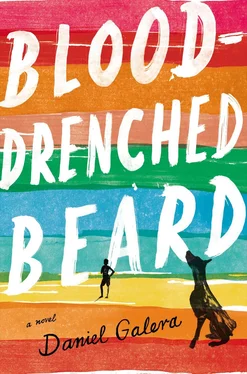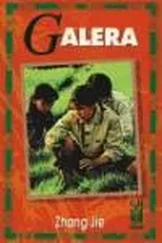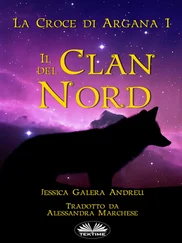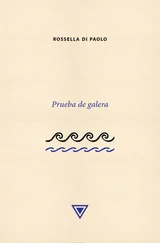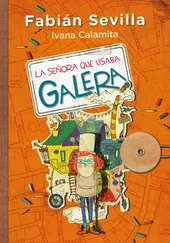He strokes Beta, who is warm in spite of everything. Suddenly, without warning, he sees with tremendous clarity something that he has wanted to see for a long time and starts to cry with happiness. He wishes Jasmim were here now, and Viviane, and his mother and father, and even Dante, even the people he wishes he could hate but can’t: he wishes they were all here with him now. His dad said it once. You aren’t capable of hating anything, kid. It can’t do you any good. But that’s life, Dad, he answers now staring into the darkness. That’s life. He feels lighter and lighter as he thinks these things and falls asleep leaning against the rock.
It takes him the whole of the next morning to get over the rocks and pick his way around a gorge. The next trail crosses the hill through thick vegetation. It is overgrown with grass and bushes, and he moves forward almost chest deep in the dark green tangle, hewing a path for the dog, who comes limping behind. Little by little his legs grow accustomed to the squelchy mud that has replaced the slippery solidity of the rocks. He mutters to himself from time to time. At the top of the hill the trail comes out above a village and a long beach. The residents watch him from the doors and windows of their houses that sit in a cluster of alleyways at the foot of the hill.
He sees people with bags full of fruit and vegetables leaving an old bus parked at the side of a sandy road. He enters the bus through the back door. In the place of seats are boxes and crates of market produce, and some women with cloth shopping bags are chatting in the middle of the aisle as they smell pineapples, squeeze mangoes, and inspect heads of lettuce. He looks around, and the profusion of colors and sweet aromas makes him dizzy. Other customers have already entered behind him, and he is forced to go with the flow toward the front door. In the closed environment, he realizes that he is wheezing and a little feverish. He gets a bunch of ripe bananas, a pear, and two oranges. The woman behind him knocks over a box of beets, which roll across the floor, and he helps her pick them up. A plump old man with white hair sitting in the driver’s seat weighs the customers’ choices on a pair of scales and takes their money. He places his items in the crate for weighing and rummages through the outside pocket of his wet backpack until he finds his last two coins.
Is this enough?
There’s a bit left over.
Keep the change.
The tabby cat on the wooden deck of an isolated beachfront bar is unperturbed by their presence. He pulls a stool up to a table and eats the fruit, gazing at the steep beach pummeled by heavy rain. He starts talking to himself and the dog and realizes that he shouldn’t stay still for too long or he won’t be able to continue. He stands, takes the steps down to the sand, and walks along the beach to the next hill.
The stormy seas have excavated the dune leading over to the next beach, exposing stone steps that are so regular they look man-made. On the other side a long series of dunes and clumps of coastal scrub hugs the contour of a beach that extends almost as far as the eye can see. He advances at a firm, slow pace, staring into the distance, lightly buffeted by the wind blowing from the ocean. He passes the skeleton of a porpoise or a right whale calf, with a crocodilian skull poking out of the waterlogged sand and a long row of half-buried vertebrae. He can’t imagine what a day without rain is like anymore.
In the middle of the afternoon he arrives at the mouth of a river that flows slowly and mightily like lava toward the sea, dragging tree branches from distant mountains. On the other side is a village, and a few fishermen are attempting a risky crossing on narrow rafts. One of them, wearing a heavy-duty raincoat, agrees to transport him to the other side and asks where he is from, where he is going, and if he needs any help. He gives each question a great deal of thought, as if he hasn’t understood it and is trying to come up with an answer only to be polite. I’ve come from there, he says pointing. I’m hiking around. Following the hills. I’m fine, thanks. Bringing me across the river is already a big help, he says, as his hand is crushed in a good-bye handshake. The fisherman then watches the hirsute figure walk away with the dog limping behind him until he disappears down the trail to the next beach, and the other fishermen come over one by one wanting to know what that was all about.
The trail goes around the first hill, following the river, and leads to a small beach occupied by a herd of cattle. The cows wander among the rocks, calves behind them, and the bulls raise their heads to watch him pass. Beta starts to bark, and part of the herd stirs and trots quickly toward the back of the beach, gathering near a small cascade formed by runoff water from the hill. There are two closed fishing sheds, one of which has a sign above the door with the name of a bar that must open only in summer. The trail continues over the next hill and comes out on a deserted beach walled in by an inaccessible green slope. As he is crossing this beach, the lightning starts. The claps of thunder take a long time to arrive after each flash but are slow to pass. He tries to pick up his pace but can go only at the same speed. He doesn’t have the strength to go any faster and is afraid he’ll give out entirely if he goes any slower.
After crossing the deserted beach, he climbs to the top of a grassy slope and is surprised by the sight of a large valley running parallel to the sea that extends as far as he can see until it is swallowed by the gray mist of the rain. The trail forks off, and he chooses to follow the crest of the hill that separates the valley from the sea because the approaching night will be stormy and the trees on that side look as if they might offer a little shelter. Night must be falling, though he can’t tell for sure, and he walks as quickly as he can. The trunks and branches of the pines on the edge of the cliff have grown curved due to the incessant wind and look as if they want to jump down to the bottom of the valley in search of some respite. The horizontal rain whips the right side of his face.
Farther in, the low, dense treetops neutralize the storm’s thrashing, shut out some of the cold, and make everything a little quieter. He is looking for a sheltered spot to spend the night when he hears a baby crying. He tries to find a plausible explanation, like the bleating of a sheep or the creaking of a tree trunk swayed by the wind, but it isn’t the kind of sound that is easily mistaken, and the second time he hears it, he is sure. He looks around thinking of hauntings and improbable phenomena. Can a sound be carried so far by the wind? A little farther along he catches sight of something yellow among the trees. He approaches cautiously, afraid of what he might find.
The yellow tarpaulin has been pulled taut and tied to the trees on a slant so the water will run off it. It serves as a roof for a small igloo-shaped tent. The baby’s crying is coming from inside it, and the light of what is probably a gas lantern projects the silhouettes of two people against the green nylon of the tent. He shouts hello and claps his hands to attract their attention. The door is unzipped. A head of long black hair with Coke-bottle glasses pokes out.
The couple are called Jarbas and Valquíria but he prefers to be called Duck and she goes by Val. The baby is thirteen months old and is called Ítalo. They are from Santa Cruz do Sul and live most of the year in an eco-village. Duck comes out of the tent and squats next to him in the small area protected by the tarpaulin, hugging his knees with his arms. He is very thin, and his glasses enlarge his eyes like magnifying lenses. His mane of unruly black curls frames his face like a cluster of flowers. Val leans out a little to say hi and take a good look at the visitor. She has thin lips, thick eyebrows, short, straight hair, and a pinkish mark high on her left cheek. Neither of them smiles at any point. Even after days or weeks of nonstop rain, their campground is dry, which must mean that Duck and Val set up camp there some time ago, before the rain started. The slightly sloping terrain helps with drainage. They have dug ditches around the tent and set up a small gas-operated camp stove. In the corner are a black umbrella and a few plastic bags of garbage. Duck lights the stove, puts a teapot on to boil, and starts preparing a gourd of maté. The baby wails endlessly and appears to have been wailing for a long time, but his parents seem to be able to tune out or ignore their protective instincts and remain immune to his shrieks.
Читать дальше
